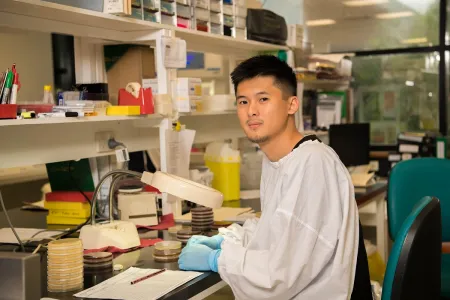News Article
Malaria research leads CDU graduate to USA
Research on a disease that impacts more than 200 million people globally each year has led a Charles Darwin University PhD graduand to Seattle in the United States to continue vital immunology work towards global malaria elimination.
Malaria poses a significant health burden globally, with more than 400,000 people losing their lives annually. Completing his PhD with CDU through the Menzies School of Health Research, Damian Oyong has made a significant contribution to fighting the disease.
Hailing from Indonesia, Dr Oyong said he was driven to help in the fight against the disease that continued to affect his local community of Papua, in Eastern Indonesia. The World Health Organisation estimates there are around one million cases of malaria annually in Indonesia, with most infections occurring in the Papuan province.
“My PhD research focused on the induction mechanisms of functional antibodies that can effectively attack the malaria parasites and prevent malaria,” he said.
“I looked at what immune system pathways were generating these antibodies, and how an individual’s age impacted antibody production.”
The findings of Dr Oyong, who will graduate with his PhD from CDU this week, would contribute to the development of an anti-malarial vaccine and saving lives.
“We found that adults generate higher amounts of protective antibodies compared to children during malarial infection,” Dr Oyong said. “Our results suggest that this age-dependent antibody production is due to the distinct profiles of T-cells of children and adults.”
He said research outcomes were significant, especially in the context of anti-malarial vaccine development since most vaccines were targeted for children where the burden of malaria was highest.
“This improved understanding of the immune cells responsible for the production of antibodies and their types will help contribute to malaria protection,” Dr Oyong said.
“I hope that my research work will contribute to the development of effective anti-malarial vaccines by gaining more understanding of how our body’s immune system reacts to malarial infection. The discovery of malaria vaccines will bring hope to global malaria elimination, which will also have a tremendous impact on my home region.”
Dr Oyong said he chose to study with CDU because he wanted to pursue his PhD under the mentorship of leading malaria researchers.
“Menzies School of Health Research is known globally for its impact in infectious disease research,” he said. “This research through CDU has a direct impact on international communities including my home country of Indonesia.”
Dr Oyong’s PhD research has led him to a role as a Postdoctoral Researcher at Seattle Children’s Research Institute, where he is continuing to research human malaria immunology as part of an international team.
Related Articles

First “hype cycle” of AI development put tech above humans
Users around the world have rushed to adopt artificial intelligence - especially in safety-critical fields - but a new study has revealed the hype has prioritised technology for technology’s sake instead of human-centred development.
Read more about First “hype cycle” of AI development put tech above humans
Nanoplastics hindering cognitive abilities of fish, international research shows
Nanoplastic exposure can impair the cognitive abilities of fish and could lead to significant impacts on marine species’ ability to survive, according to a new international study.
Read more about Nanoplastics hindering cognitive abilities of fish, international research shows
New project to grow Indigenous aquaculture on one of Australia’s largest islands
An Australian island’s efforts to improve food security and transition into a blue economy will be bolstered by a new project to propagate a nutritious and increasingly popular fish.
Read more about New project to grow Indigenous aquaculture on one of Australia’s largest islands
